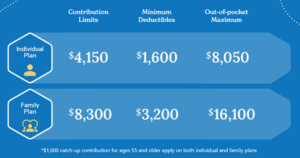
It is that time of year again—when employees are going through open enrollment. Usually, employees stay with their prior year’s election, whether it’s the amount they defer into a corporate 401(k) or the type of health plan coverage. In other words, the status quo wins out most of the time.
Inertia is a big issue when it comes to annual workplace benefit considerations. Employees should spend more time educating themselves about their various options. One example is the decision of whether to enroll in a qualified high deductible health plan (HDHP) that includes a health savings account (HSA).
A HDHP accompanied by a HSA can be a very powerful way to bolster your retirement readiness profile. Most employees are unaware that HSA funds can be invested, and the invested portion can be seen as a specialized retirement account for health care.
It’s important to note that HSAs are much different than flexible spending accounts (FSAs). Unlike a FSA, a HSA is owned by the employee and is portable. If you leave your employer, you can take your HSA with you. And HSA funds do not need to be spent down each year like FSA funds. In fact, the objective should be to grow your HSA over time.
2024 HSA and HDHP Numbers

Not all employers offer a HDHP. If your employer does, you should analyze whether the HDHP is a viable option for you and your family. Here are some things to keep in mind when you are making your health plan benefit election:
- Start with looking at the premiums for each offered plan. But don’t forget that health insurance premiums paid by an employee are tax deductible, which translates to a lower after-tax cost. For example, a $500/month premium for a taxpayer in the 24% federal tax bracket is effectively only $380/month.
- Factor in the tax benefit of making HSA contributions. For an individual, the 2024 maximum contribution to a HSA is $4,150. For a family plan, it is $8,300. If you’re 55 or older, you can contribute an extra $1,000 per person over 55. These contributions are tax deductible and can be a significant factor in the analysis. A contribution of $8,300 for a household in the 24% federal tax bracket equals $1,992 in federal taxes.
- Look for employer contributions to your HSA. These contributions count against the total you can contribute to your HSA and are not tax deductible, but they help offset the deductible on a HDHP and are not taxable to you.
- Try to predict what you think your medical expenses will be for next year by looking at your past year’s medical usage.
- Be sure to understand the out-of-pocket maximum costs across all plans. You’ll need to understand how the deductible, co-pays, coinsurance and out-of-pocket maximum will work for each plan.
A HDHP is not ideal for everyone, particularly those who know they will be facing high medical costs in the future (e.g., undergoing an operation, giving birth, having a preexisting condition). The ideal candidate for a HDHP is a person or household that is generally healthy and does not experience a high level of predictable out-of-pocket health care costs.
Final thoughts
We wrote a very in-depth article about the benefits of a HSA this past summer. Suffice it to say that the HSA tax benefits are the most generous of any retirement savings vehicle legislated by Congress. The tax advantages offered by a HSA can have a significant positive impact on your long-term financial picture. If you are interested in discussing your health insurance options during open enrollment or leveraging the power of a HSA, please reach out to our team.
Disclaimer: This is not to be considered investment, tax, or financial advice. Please review your personal situation with your tax and/or financial advisor. Milestone Financial Planning, LLC (Milestone) is a fee-only financial planning firm and registered investment advisor in Bedford, NH. Milestone works with clients on a long-term, ongoing basis. Our fees are based on the assets that we manage and may include an annual financial planning subscription fee. Clients receive financial planning, tax planning, retirement planning, and investment management services and have unlimited access to our advisors. We receive no commissions or referral fees. We put our client’s interests first. If you need assistance with your investments or financial planning, please reach out to one of our fee-only advisors. Advisory services are only offered to clients or prospective clients where Milestone and its representatives are properly licensed or exempt from licensure. Past performance shown is not indicative of future results, which could differ substantially.



